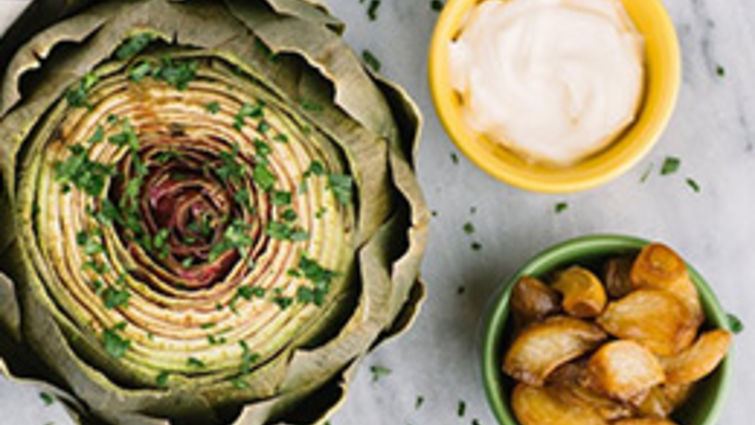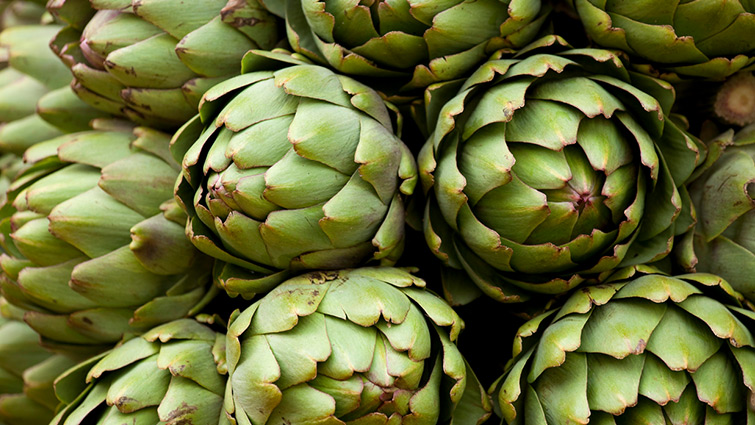One of the popular thistle vegetables of Mediterranean origin, artichokes are a nutrient rich and heart healthy delicacy, specially cultivated to be tasty.

Recipe: Artichoke with Aioli Sauce
Serving size: 1/2 medium Artichoke
Servings per recipe: 4
Prep time: 5 min
Cook time: 45-60 min
- 2 medium - Artichokes
- 3 cups - Water
- 3/4 cup - Mayonnaise
- 1 clove - Garlic, finely minced
- 1 ea - Lemon, zest and juice
- Pinch - Cayenne pepper
Directions
Steamed Artichoke: Trim the base and the top third of the artichoke with a knife. With your kitchen shears, trim off all the sharp ends of the leaves. Rub the cut top with a lemon wedge to prevent browning.
Set a steamer basket into a large soup pot along with 3 cups of water. Put artichokes, top down and cover and steam for 45-60 minutes depending on the size of your artichokes. To check if your artichoke is done, lightly try to pull a leaf out. If done, the leaf will easily pull away. Be careful not to burn yourself. Remove artichokes with tongs.
Serve warm with the lemon garlic aioli dipping sauce.
Lemon Garlic Aioli Sauce: Combine mayonnaise, minced garlic, lemon juice, lemon zest and cayenne pepper. Serve chilled. The sauce will keep in the fridge for up to one week.
Nutrition Facts
Serving size:
| Calories | 564 |
| Carbohydrates | 1g |
| Total Fat | 62g |
| Saturated Fat | 10g |
| Monounsaturated Fat | 14g |
| Polyunsaturated Fat | 37g |
| Sodium | 524mg |
| Total Carbohydrate | 1g |
| Sugar | 1g |

Star Ingredient:
Artichokes Contain:
Vitamin K*
Vitamin K has long been known for its role in blood clotting. It also participates in the synthesis of several bone proteins. Bacteria in the intestinal track synthesize vitamin K that the body can absorb but people cannot depend on this source alone for vitamin K. Many foods contain ample amounts of vitamin K, notably green leafy vegetables and members of the cabbage family. If you are taking blood-thinning medication, be sure to talk with your Registered Dietitian or Physician about how much vitamin K is safe for you to consume.
Vitamin C*
Did you know the human body does not have the ability to produce vitamin C on its own? That’s why it’s so important to make sure we are eating a wide variety of foods with Vitamin C. This vital vitamin is not only useful to help our bodies fight off the common cold, but it’s necessary for the absorption of iron and very important for our connective tissues. Connective tissues are what keep our skin firm and our muscles strong. Because vitamin C supports our connective tissues, it is also useful in speeding up the healing process. If you have a wound, you might want to consider increasing the intake of foods higher in vitamin C.
Trivia: Cats and dogs can make vitamin C therefore they don’t need fruits and vegetables.
Fiber*
We have all heard we don’t get enough fiber. Do you know why we need fiber? Mainly we need fiber to relieve and reverse symptoms of constipation. Fiber is only found in vegetables, fruits, legumes and whole grains. The fibers of plants are constituents of plant cell walls. Hemicellulose, pectins, gums and mucilages are examples of different types of fiber. Some fibers cannot be digested; however, some can be digested by bacteria in the human digestive tract and can generate some absorbable products which can yield energy when metabolized. Insoluble fibers do not dissolve readily in water while soluble do. Both types contribute to digestive health.
*These statements have not been evaluated by the Food and Drug Administration. This is not intended to diagnose, treat, cure, or prevent any disease.

